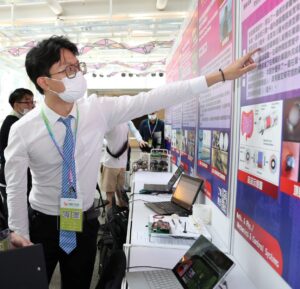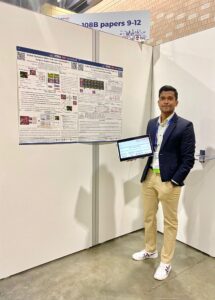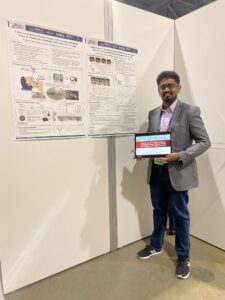Dr. Ren won the Healthy Longevity Catalyst Award (Hong Kong) 2022 with research on intragastric balloons.
More information can be found at:
CUHK bags three wins at Healthy Longevity Catalyst Awards (Hong Kong) 2022
Dr. Ren won the Healthy Longevity Catalyst Award (Hong Kong) 2022 with research on intragastric balloons.
More information can be found at:
CUHK bags three wins at Healthy Longevity Catalyst Awards (Hong Kong) 2022
Congratulations to the following members for the papers accepted by MICCAI2022:
Our Team projects Modular Parallel Robot and Magnetic Capsule won awards at The 8th Hong Kong University Student Innovation and Entrepreneurship Competition, organized by Hong Kong New Generation Cultural Association, on May 27-28, 2022!
Third-place Award: Magnetic Capsule, Presented by Sishen
Merit Award: Modular Parallel Robot, Presented by Wenchao

Congratulations to the following members for the 3 papers accepted by ICRA2022 and presentations at ICRA2022:
Godwin: Chip-Less Real-Time Wireless Sensing of Endotracheal Intubation Tubes by Printing and Mounting Conformable Antenna Tag
Lalith: Global-Reasoned Multi-Task Learning Model for Surgical Scene Understanding
Ling: SIRNet: Fine-Grained Surgical Interaction Recognition
Godwin and Lalith are presenting at ICRA on site this year:
https://www.icra2022.org/


Dr. Ren, together with Godwin, was invited to give a talk at IEEE IMBioC (International Microwave Biomedical Conference) 2022, on Kirigami Strain Sensors Using Conductive Trace and Radio Frequency Estimation for Robotics. Related webpages: http://www.nusri.cn/IMBioC2022/
Our Team projects Skull-bot and Magnetic Capsule won awards at EMedic Global 2021!
Silver Award: Skull-bot
Best Presentation Award: Skull-bot https://youtu.be/xrwjYkMsktA
Technical Challenge Award: Magnetic Capsule https://youtu.be/XxlTGHfyLeY
Dr. Ren was invited to give 2 talks at 2021 ISMR (International Symposium on Medical Robotics) workshops
Talk 1: “Flexible Endoluminal Robotics with Minimal Invasiveness and Exposure” for workshop on “Model-based Design, Sensing, and Control of Continuum
Manipulators and Robotic Flexible Instruments“
Talk 2: “Multidimensional Sensing and Perception for Dexterous Medical Robotics” for workshop on “Sensing and Feedback in Dexterous Medical/Surgical Robotics” respectively:
Related webpages: http://www.ismr.gatech.edu/workshop-program
Dr. Ren was invited to give a keynote speech at the 2021 ICRA (International Conference on Robotics and Automation) RoPat workshop on ‘Robot-Assisted Systems for Medical Training’
Related webpage:
https://www.imperial.ac.uk/morph-lab/events/ropat21-icra-workshop/
Surgical motion generation and motion understanding towards augmented minimally invasive robotic procedures, Dr. Hongliang Ren
Abstract:
Minimally Invasive Surgeries emerging in modern medical treatment have brought new opportunities and challenges for procedure-specific surgical motion generation and the associated motion understanding, which are the foundation of intelligent robotic manipulation and guiding interventions. Image-guided robotic surgery is expected to increase the precision, flexibility, and repeatability of surgical procedures but poses challenges for medical training.
This talk will highlight some recent developments in dexterous robotic motion generation with motion understanding towards image-guided minimally invasive procedures. The procedure-specific telerobotic surgical systems can assist surgeons in performing dexterous manipulations using the master-slave console bilateral motion generation & mapping mechanism with variable stiffness.
Meanwhile, surgical motion understanding aims to learn from the multi-domain surgical perceptions and describe the semantic relationship between instruments and surgical region of interest. Automatically understanding the instrument motions in robotic surgery is crucial to enhance surgical outcomes, enable surgical camera automation, and facilitate surgical training. To that end, we generate the task-aware saliency maps and scanpath of the instruments beyond tracking and segmentation, similar to the surgeon’s visual perception, to get the priority focus on selected surgical instruments. Furthermore, generating a surgical report in robot-assisted surgery, together with surgical scene understanding, can play a significant role in document entry tasks, surgical training, and post-operative analysis.
Workshop video material (available at the workshop webpage): https://www.youtube.com/watch?v=rPSOs_ie-ZQ
Dr. Ren was invited to talk at 2021 ICEE workshop on Safeguarding Public Health During Infectious Disease Pandemics Using Medical Robotics, Wearable Technology, and AI.
Related webpages:
https://sites.google.com/ualberta.ca/2021-icee-workshop
Pilot Study of Trans-oral Robotics to Meet the Minimal Exposure Needs During Infectious Disease Pandemics, Dr. Hongliang Ren
Abstract: Swabbing tests have proved to be an effective method of diagnosis for a wide range of diseases. There are high risks of infection for surgeons during the face-to-face COVID-19 swab sampling due to the novel coronavirus’s infectivity. Teleoperated or self-administered swabs can mitigate potential occupational health hazards and reliance on healthcare workers during traditional swabbing procedures. We present some pilot studies on flexible transoral robotic approaches and mechanisms for swab sampling. One prospective robot comprises a flexible manipulator, an endoscope with a monitor, and a master device. A 3-prismatic-universal flexible parallel mechanism with 3 degrees of freedom (DOF) is used to realize the manipulator’s movements. The flexibility of the manipulator improves the safety of testees. Under the vision guidance from the endoscope, a master device can control the swab’s motion attached to the manipulator for sampling. We will also discuss other possible methods to apply closed kinematic chain theory to develop a self-administered viral swab to collect respiratory specimens. The proposed sensorized swab models utilizing hollow polypropylene tubes possess mechanical compliance, simple construction, and inexpensive components. These foldable telescopic structures with multiple kirigami cuts minimize components involved in the system as the characteristics are built directly into the material.
Congratulations to the following members for the papers accepted by ICRA2021 and presentations at pre-ICRA2021:
Menya Learning Domain Adaptation with Model Calibration for Surgical Report Generation in Robotic Surgery https://youtu.be/Eu-ryJ9OyTM
Godwin Chip-Less Wireless Sensing of Origami Structural Morphing under Various Mechanical Stimuli Using Home-Based Ink-Jet Printable Materials https://youtu.be/HXgW2S21OGI
Huxin Remote-Center-Of-Motion Recommendation Toward Brain Needle Intervention Using Deep Reinforcement Learning https://youtu.be/Py5Vw_hQryY
Bok Seng Origami-Inspired Snap-Through Bistability in Parallel and Curved Mechanisms through the Inflection of Degree Four Vertexes https://youtu.be/mCBPTVw5_kw
Changsheng A Miniature Manipulator with Variable Stiffness towards Minimally Invasive Transluminal Endoscopic Surgery https://youtu.be/b_zW9MHgG5g
Ruphan Multiphysics Simulation of Magnetically Actuated Robotic Origami Worms https://youtu.be/UCkLuhoN0ME